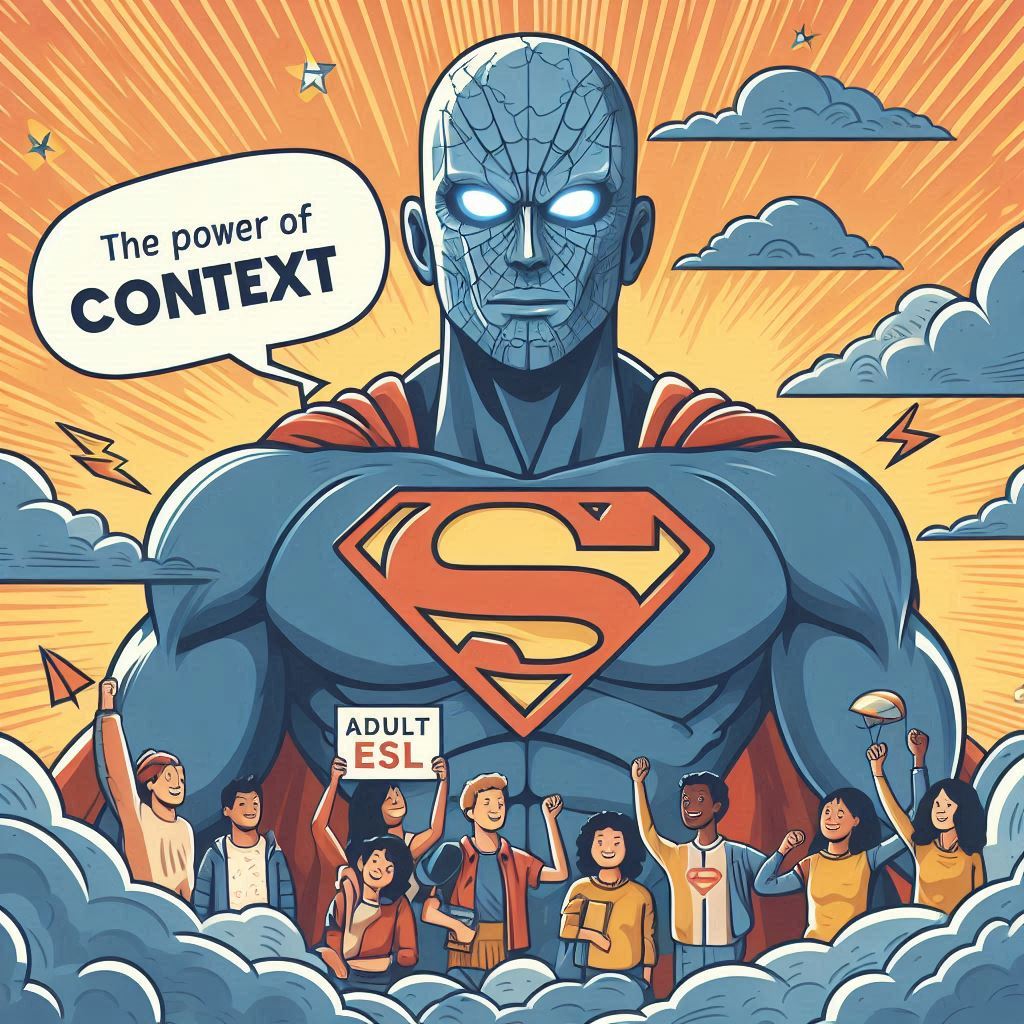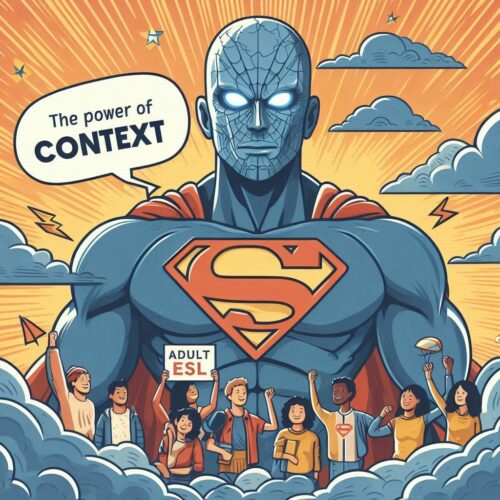Unlock the power of contextual vocabulary acquisition! Dive into dynamic strategies for learning English on EnglishTeacherKBob’s vibrant platform. Enhance your language skills with immersive context, enriching your journey to fluency. Explore now.
I’m going to reveal how the English language can be mastered through the power of context. This isn’t just about memorizing word lists; it’s also about understanding how words come to life in everyday communication. There’s a dynamic way to acquire vocabulary that doesn’t involve relentless drilling: contextual vocabulary acquisition.

You’re going to find out about the stark contrast between traditional rote learning and the more natural, intuitive approach of absorbing vocabulary through context. While rote learning relies on repetition and memorization, contextual learning thrives on understanding and connection to real-life situations.
I’ll share inspiring real-life examples demonstrating the effectiveness of contextual learning. From expatriates picking up the local slang to avid readers acquiring sophisticated diction, the evidence is compelling. And it’s not just about anecdotal evidence—I’ll also delve into the cognitive science that explains why learning through context is often more sustainable and rewarding.
So, what’s happening in our brains when we learn through context? It turns out that contextual clues can create stronger and more meaningful connections in our minds. It’s a bit like putting together a puzzle; each piece of information helps to form a more complete picture. And when you come across a new word or phrase within a familiar scenario, it sticks—not just for now, but for the long haul.
Setting the Scene: How Context Improves Vocabulary Retention
You might remember cramming for a test, repeating word after word, hoping they’d stick. But have you noticed how you can recall the lyrics to a song you haven’t heard in years? That’s context doing its magic. I’m going to show you how that same magic can transform your English vocabulary learning.

There’s this thing about our brains; they’re wired to retain information better when it’s connected to a specific situation or setting. Think of context as the glue that helps memories stick. Psycholinguistic research tells us that learning words in context dramatically enhances our ability to remember and use them correctly.
You’re probably wondering, what does ‘immersing in context’ actually look like? It’s simple: Encasing your learning in a meaningful framework. Whether it’s through movies, songs, or just chatting with friends, real-world engagement provides a rich tapestry that embeds new words deeper into your memory.
And this isn’t just about passive absorption. Engage with English by actively seeking sentence examples, dialogues, or expressions. Case studies reveal that learners who throw themselves into contextual experiences tend to develop a more nuanced understanding of the language, along with a robust, readily accessible vocabulary.
Tools and Strategies for Effective Contextual Vocabulary Learning
I’m about to give you the inside scoop on some of the best tools and strategies that you can use to learn English vocabulary through context. This isn’t just about memorizing lists of words; it’s also about making the learning process enjoyable and engaging.

Multimedia resources are pure gold when it comes to language acquisition. That’s going to include English TV shows, movies, podcasts, and songs. You’re going to find out about the cultural nuances and idiomatic expressions that textbooks often miss.
Language learning apps have been making waves, and for a good reason. I’m talking about those that specialize in context-based learning. They bring vocabulary to life by showing you how words function in real conversation and written texts.
Cultural immersion plays a critical role, even if you’re learning from the comfort of your own home. Through online communities, English news outlets, and virtual reality experiences, you can dip your toes into the linguistic waters without having to travel across the globe.
Nothing beats building vocabulary than actually seeing and hearing the language in use. Think about reading books, listening to the news, and observing conversations. Each of these activities is an opportunity to see how English speakers naturally use language.
So, What’s next? You’ll be looking to measure your progress and see the fruits of your labor, which I’ll talk about in the following section.
Measuring Your Progress: The Impactful Outcomes of Contextual Learning
I’m going to explain why gauging your success in English vocabulary acquisition is crucial. This isn’t just about acknowledging your hard work; it’s also about understanding the effectiveness of your learning strategies. Assessing vocabulary growth through context-based benchmarks allows for a personalized and dynamic assessment approach, where real-world comprehension and usage become key indicators of your progress.

You’re going to find out about personal success stories that will not only inspire you, but also give you concrete examples of how contextual learning paves the way for an enriched vocabulary. From students who’ve travelled abroad to immigrants who’ve embraced a new culture, these narratives showcase that when language is learned in context, it sticks for the long haul.
Now, let’s talk about reflection and adjustment. The learning journey is rarely a straight path, and contextual learning is no exception. The role of self-reflection is paramount, as it enables you to examine which contexts serve you best and which approaches need a tweak. Adjusting your methods along the way ensures that you are always moving closer to your language goals.
Looking forward, ongoing research in language acquisition and new technological advancements promise even more tailored and immersive experiences. This means the potential gains from contextual vocabulary learning are not static; they’re likely to expand as we find more innovative ways to integrate context with language studies. So, remember to keep yourself open to new strategies and perspectives that can further enhance your learning experience.
People Also Ask

Q: What is contextual vocabulary acquisition? A: Contextual vocabulary acquisition is a method of learning new words within the context of a sentence, paragraph, or situation, which helps learners understand how words are used in real-life situations.
Q: How does learning English through contextual vocabulary acquisition benefit learners? A: By learning English through contextual vocabulary acquisition, learners not only grasp the meaning of individual words but also understand their usage in different contexts, leading to improved comprehension and communication skills.
Q: Is contextual vocabulary acquisition suitable for all levels of English learners? A: Yes, contextual vocabulary acquisition can be tailored to suit learners of all levels. Beginners can start with basic vocabulary in simple contexts, while advanced learners can engage with more complex language structures.
Q: Are there specific strategies for effective contextual vocabulary acquisition? A: Yes, strategies such as reading extensively, using context clues, and practicing active recall can enhance contextual vocabulary acquisition. Engaging with authentic materials like articles, stories, and videos also aids in the process.
Q: Can contextual vocabulary acquisition be integrated into language learning classrooms? A: Absolutely! Language teachers can incorporate contextual vocabulary acquisition into their lessons through interactive activities, discussions, and tasks that encourage students to analyze and apply vocabulary in context.
Leave comments and questions in the comments section below. I will promptly reply.


I remember when a memorization mentor I was being coached by suggested that I associate outrageous images with the word or string of words that I was trying to memorize because that way the likelihood of remembering it was high due to the context I associated with the word or words. So far, it’s worked for many words I’m trying to remember.
Hi Marci, thanks for your comments. I love your coach’s suggestion. I do that kind of naturally. I will suggest that to my students.
Leave comments and questions here anytime. I will promptly reply.
KBob
I was slightly confused when I saw the title of the post of learning English through contextual acquisition, as I thought it was about acquiring vocabulary cards or games by purchasing them. But after reading the post, I understood what is meant by acquisition.
It is certainly easier to learn a new language, through contextual learning. And that applies to all languages, not only English. I have found that learning songs and watching TV, has been the best and quickest way for learning a foreign language. Thank you for sharing this helpful resource.
Hi LineCowley, welcome back. Thanks for your comments. Yes, English does not have the market cornered when it comes to language learning. The key to learning a language is being able to communicate effectively. Context is maybe not what it’s all about but it’s a huge factor. I’m glad you came to understand the point of the article.
Leave comments and questions here anytime. I will promptly reply.
KBob